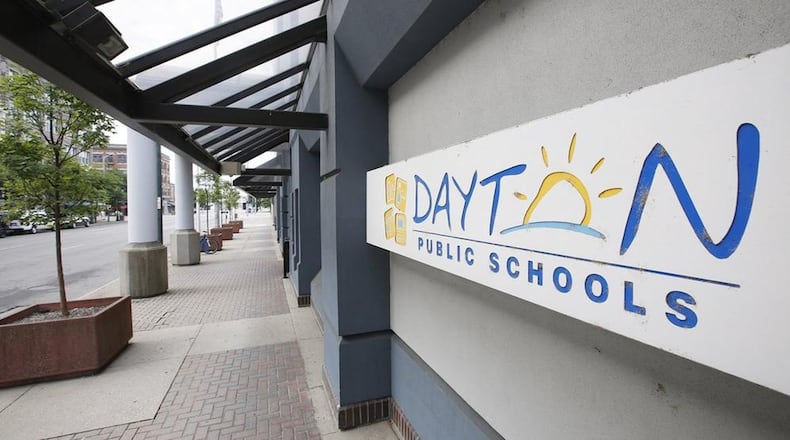• An additional $10 million per year for three years to address high-priority building maintenance items including roofs, parking lots and HVAC systems;
» MORE: Dayton schools' staffing issues affect hundreds of kids daily
• An ongoing $4.5 million per year for a “salary adjustment for teachers,” which teachers union president David Romick confirmed is part of a two-year contract extension through the 2021-22 school year;
• An estimated $4.1 million in 2019-20, and $3.2 million each subsequent year to reinstate busing for qualifying high school students, via a contract with RTA;
• A tentative $10 million for repair of Welcome Stadium, although that is tentative pending a consultant’s feasibility review, and those funds have not been earmarked in the district’s five-year financial forecast.
“We’re raising our starting (teacher) salaries to about $44,000 … and we also raised our principal salary schedule to make them more comparable to area schools,” Lolli said Wednesday. “It’s about how we recruit and how we retain (talent) — how do we help kids.”
» RELATED: Dayton school staff turnover worries parent group leader
The document the school board reviewed and approved Tuesday night included itemized costs for 14 projects and listed a total first-year cost of $26.16 million. But a Dayton Daily News review of the information revealed that the numbers didn’t add up. The total of the 14 separate items comes to $30.26 million.
Asked about the discrepancy Wednesday, Lolli said it was probably a typo. But when this news organization pointed out that the numbers were exactly $4.1 million apart, Lolli agreed that the high school busing amount likely had not been included in the document’s total.
Treasurer Hiwot Abraha presented a new financial forecast to accompany the plan. Previously, the district projected it would safely have at least 10% of a year’s expenses in reserve until 2022-23. The new forecast says the district would dip below a 10% balance a year earlier, in 2021-22.
School board member John McManus, who was the lone vote against much of the plan, asked Tuesday night for a year-over-year breakdown of the costs, saying the district was committing itself to much more than one year and $26 million. Lolli said the plan would cost an extra $28.8 million in the second year and $28.7 million in the third year.
MORE: State proposal could lower college tuition for active duty military
McManus called it “absolutely unconscionable” that the board would vote for such a massive expense at the same meeting it was laying off a total of five interpreters, audiologists and special education compliance staff. Those votes were 4-1-1, with McManus voting no and Robert Walker abstaining.
Angela Nichols, DPS special education chief, said most of those cuts were proposed because staffing exceeded need, given the number of students using those services.
Romick said Dayton’s teachers union membership last week approved the two-year contract extension, which he said includes the salary adjustment and a few other changes. DPS officials would not release the new teacher salary schedules Wednesday, but Lolli said those contract documents will be on a June school board agenda.
Dayton’s starting teacher salary for 2018-19 was competitive with most local districts, at $40,671. But while several suburban districts pay their most educated veteran teachers around $90,000, Dayton’s existing salary scale tops out at $74,505. DPS officials say they lose many good teachers after a few years, when they move on to higher-paying districts.
“This does enhance our ability to recruit staff,” Romick said, adding that the new contract will add some raises between Year 15 and Year 20 that don’t currently exist.
Two years after a nasty contract fight that almost led to a teacher strike, Romick also said these years of stability – barring state takeover this fall – will be good for teachers, students and the district as a whole.
The building maintenance items in Lolli’s plan are “taken from the Four Seasons Report” produced by a consultant, according to Tuesday’s agenda document. This news organization requested a copy of that report 15 days ago but has not received it.
Lolli said the high school busing investment is complicated by the fact that if DPS is going to bus its own high school students, it must make the same level of service available to charter-school and private-school voucher students. The RTA plan would involve 32 additional buses making a variety of neighborhood stops – not providing door-to-door pickup.
Other items in the plan include hiring 10 more behavioral and mental health specialists ($882,000 per year), increased after-school programming ($100,000 per year), Montessori training and materials ($250,000 per year for three years), materials and training for elementary English and middle school-high school STEM work ($225,000 per year for two years), and salary adjustments for principals and assistant principals ($153,000 per year).
Also Tuesday, the school board approved a three-year $12.9 million contract with a new provider for substitute teachers and staff at the district’s schools. ESS Northeast, LLC, formerly Source4Teachers, will replace Parallel Employment Group as the contractor providing substitutes for Dayton Public Schools.
DPS data showed that Parallel exceeded the terms of its contract this spring, but the district was simply asking for more subs than the contract anticipated, with occasional, hard-to-manage spikes. A representative from Parallel on Tuesday encouraged the school board to table the contract vote, but they did not.

